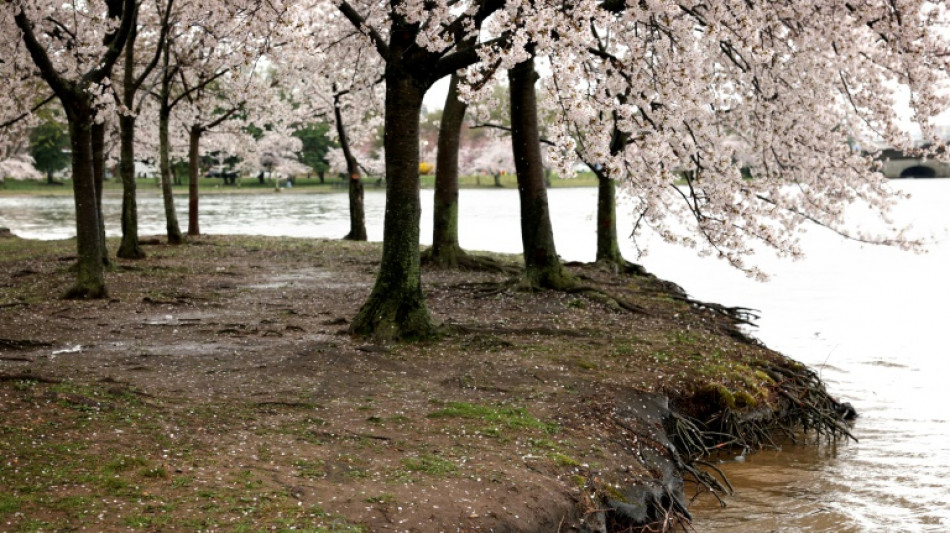
-
 Myanmar pro-military party claims huge lead in junta-run poll
Myanmar pro-military party claims huge lead in junta-run poll
-
Dazzling Dupont brings France cheer heading into new year

-
 Emirates mining company challenges Guinea licence withdrawal
Emirates mining company challenges Guinea licence withdrawal
-
Netanyahu to meet Trump in Florida for talks on Gaza, Iran

-
 Thai army accuses Cambodia of violating truce with over 250 drones
Thai army accuses Cambodia of violating truce with over 250 drones
-
Myanmar pro-military party claims huge win in first phase of junta-run poll

-
 Stocks mixed, precious metals slip in quiet trade
Stocks mixed, precious metals slip in quiet trade
-
Russia reopens theatre devastated by siege of Mariupol

-
 Wawrinka 'at peace' with retirement but no plans to go quietly
Wawrinka 'at peace' with retirement but no plans to go quietly
-
New year brings new mayor for New York City

-
 Netanyahu to meet Trump in Florida for crucial Gaza talks
Netanyahu to meet Trump in Florida for crucial Gaza talks
-
NBA-best Thunder end skid while Kawhi hits career-high 55

-
 China launches military drills simulating blockade of Taiwan ports
China launches military drills simulating blockade of Taiwan ports
-
Myanmar pro-military party 'winning' junta-run poll first phase: source

-
 Bondi victims' families demand national probe into antisemitism
Bondi victims' families demand national probe into antisemitism
-
Sudanese trek through mountains to escape Kordofan fighting

-
 Australia coach McDonald backs under-fire MCG curator
Australia coach McDonald backs under-fire MCG curator
-
South Korea's ex-first lady accused of taking over $200,000 in bribes

-
 Pelicans guard Alvarado, Suns center Williams draw bans
Pelicans guard Alvarado, Suns center Williams draw bans
-
China announces 'major' military drills around Taiwan

-
 Stocks mostly rise, precious metals slip in quiet Asian trade
Stocks mostly rise, precious metals slip in quiet Asian trade
-
Injured England quick Atkinson out of 5th Ashes Test

-
 Bardot: from defending sheep to flirting with the far right
Bardot: from defending sheep to flirting with the far right
-
China's BYD poised to overtake Tesla in 2025 EV sales

-
 De Minaur muscles up in bid to be Sinner-Alcaraz 'disruptor'
De Minaur muscles up in bid to be Sinner-Alcaraz 'disruptor'
-
North Korea tests cruise missiles in show of 'combat readiness'

-
 NBA-best Thunder end two-game skid as Raptors win in OT
NBA-best Thunder end two-game skid as Raptors win in OT
-
BioLargo Reflects on 2025 Progress and Positions for the Next Phase of Global Infrastructure, Environmental, and Medical Innovation

-
 Nine Conflict-Driven "Hospital It Collapse Zones" Identified; Global EMR Vendors Urged to Unite in a 2026 Health System Connectivity Compact
Nine Conflict-Driven "Hospital It Collapse Zones" Identified; Global EMR Vendors Urged to Unite in a 2026 Health System Connectivity Compact
-
Special Exhibit: Picasso and Lin Xiang Xiong - A Dialogue Across Time

-
 ASMALLWORLD Brings Luxury Travel Privileges to Klarna's Membership Programme
ASMALLWORLD Brings Luxury Travel Privileges to Klarna's Membership Programme
-
Root says 'silly' to change England management after Ashes loss

-
 Algeria advance to AFCON last-16, Cameroon hold Ivory Coast
Algeria advance to AFCON last-16, Cameroon hold Ivory Coast
-
Diallo scores again as champions Ivory Coast draw with Cameroon

-
 Dupont sparks explosion as Toulouse demolish La Rochelle
Dupont sparks explosion as Toulouse demolish La Rochelle
-
Steelers, Panthers lose to set up showdowns for playoff berths

-
 Inter stay top of Serie A after beating battling Atalanta
Inter stay top of Serie A after beating battling Atalanta
-
Serbia's students gather signatures for early elections goal

-
 Mahrez penalty takes Algeria through to Cup of Nations last 16
Mahrez penalty takes Algeria through to Cup of Nations last 16
-
Third 'Avatar' film stays atop N. American box office rankings

-
 Somaliland recognition prompts celebrations, condemnation
Somaliland recognition prompts celebrations, condemnation
-
Trump says Zelensky and Putin 'serious' in war talks sprint

-
 UK's Starmer under fire over Egyptian activist's 'abhorrent' posts
UK's Starmer under fire over Egyptian activist's 'abhorrent' posts
-
Guinea junta chief headed for victory in presidential vote

-
 Central African Republic president tipped to win third term
Central African Republic president tipped to win third term
-
Spurs deliver big win for Frank as Calvert-Lewin denies Sunderland

-
 Shiffrin produces her 'best, best run' to extend slalom streak
Shiffrin produces her 'best, best run' to extend slalom streak
-
Kyrgios beats Sabalenka in 'Battle of the Sexes'

-
 Calvert-Lewin stretches hot streak as Leeds hold Sunderland
Calvert-Lewin stretches hot streak as Leeds hold Sunderland
-
Liverpool's set-piece problems a 'killer' - Van Dijk


Living near green space makes you 2.5 years younger: study
City parks and green spaces help counter heat, boost biodiversity, and instill a sense of calm in the urban jungle.
They also help slow biological aging, with people who have access to green spaces found to be on average 2.5 years biologically younger than those who do not, according to a new study published Wednesday in Science Advances.
"Living near more greenness can help you be younger than your actual age," Kyeezu Kim, the study's lead author and a postdoctoral scholar at Northwestern University's Feinberg School of Medicine, told AFP.
"We believe our findings have significant implications for urban planning in terms of expanding green infrastructure to promote public health and reduce health disparities."
Exposure to green spaces has previously been linked with better cardiovascular health and lower rates of mortality.
It's thought that more physical activity and social interactions are at play, but whether parks actually slowed down aging on a cellular level has been unclear.
To investigate, the team behind the study examined DNA chemical modifications known as "methylation."
Prior work has shown that so-called "epigenetic clocks" based on DNA methylation can be a good predictor of health conditions such as cardiovascular disease, cancer, cognitive function, and a more accurate way of measuring age than calendar years.
Kim and colleagues followed more than 900 white and Black people from four American cities -- Birmingham, Chicago, Minneapolis, and Oakland -- over a period of 20 years, from 1986-2006.
Using satellite imaging, the team assessed how close the participants' residential addresses were to surrounding vegetation and parks, and paired this data with blood samples taken in years 15 and years 20 of the study, to determine their biological age.
The team constructed statistical models to evaluate the results, and control for other variables, such as education, income, and behavioral factors like smoking, that might have affected the results.
They found that people whose homes were surrounded by 30 percent green cover within a five kilometer (three mile) radius were on average 2.5 years younger biologically compared to those whose homes were surrounded by 20 percent green cover.
The benefits were not evenly shared. Black people with more access to green space were only one year biologically younger, while white people were three years younger.
"Other factors, such as stress, qualities of the surrounding green space, and other social support, can affect the degree of benefits of green spaces in terms of biological aging," said Kim, explaining the disparities required further study.
For example, parks in deprived neighborhoods used for illicit activities might be less frequented, negating the benefits.
Next steps might involve investigating the link between green spaces and specific health outcomes, she added. It's also not yet clear how exactly greenery reduces aging -- only that it does, added Kim.
Epidemiologist Manuel Franco, of the University of Alcala and Johns Hopkins, called the research a "well designed study."
"We have more and better scientific evidence to increase and promote the use of urban green spaces," added Franco, who was not involved in the study.
O.Karlsson--AMWN


